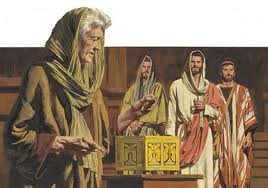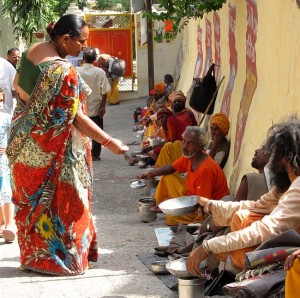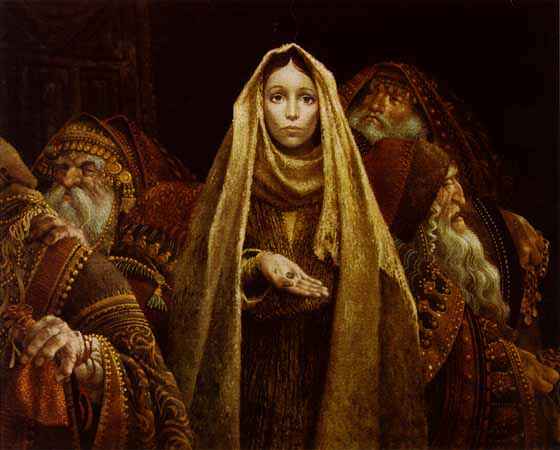
-10-11-2024-
Thirty-Second Sunday in Ordinary Time
Gospel text: Mark 12:38-44
vs.38 In his teaching to the crowds Jesus said,
“Beware of the scribes who like to walk about in long robes, to be greeted obsequiously in the market squares,
vs.39 to take the front seats in the synagogues and the places of honour at banquets;
vs.40 these are the men who swallow the property of widows, while making a show of lengthy prayers. The more severe will be the sentence they receive.”
 vs.41 He sat down opposite the treasury and watched the people putting money into the treasury, and many of the rich put in a great deal.
vs.41 He sat down opposite the treasury and watched the people putting money into the treasury, and many of the rich put in a great deal.
vs.42 A poor widow came and put in two small coins, the equivalent of a penny.
vs.43 Then he called his disciples and said to them,
“I tell you solemnly, this poor widow has put more in than all who have contributed to the treasury;
vs.44 for they have all put in money they had over, but she from the little she had has put in everything she possessed, all she had to live on.”
*******************************************
We have four commentators available from whom you may wish to choose
Michel DeVerteuil :Holy Ghost Priest, director of the Centre of Biblical renewal Centre, Trinidad WI.
Thomas O’Loughlin: Professor of Historical Theology University of Nottingham NG7 2RD
Sean Goan:Studied scripture in Rome, Jerusalem and Chicago
Donal Neary SJ: Editor of The Sacred Heart Messenger and National Director of The Apostlship of Prayer.
****************************************
Michel DeVerteuil
Lectio Divina with the Sunday Gospels
www.columba.ie
Textual Comments
Jesus is teaching in Jerusalem, the centre of the Jewish religion, the heart of the opposition to all he stood for. Remembering this context will give an added dimension to our meditation.
The passage is in two sections:
– verses 38 to 40, Jesus teaching
– verses 41 to 44, the touching story of the widow.
In verses 38 to 40 we see first the simple fact that Jesus spoke out courageously in Jerusalem – a model not merely for the church but for all his followers. Then there is the content of his teaching – the tendency for all of us religious people to seek public approval (usually an unconscious tendency brought to light by a Jesus person). Follow St Mark in making a connection between that tendency and swallowing the property of widows in verse 40.
We must be careful to interpret verses 42 to 44 correctly.
Jesus is not pointing out the difference between people who can give plenty and people who can give very little, as the passage is often interpreted. He is pointing out the difference between giving what we have left over and giving all that we have.
You might like to focus on Jesus again in this section – for example, on the fact that he noticed the widow. What kind of person does this show him to be?
You might also like to see if you can make a connection between the two sections of the passage, based on your own experience.
Scripture Reflection Prayers
 Lord, people today set great store on show;
Lord, people today set great store on show;
~ the wealthy and powerful are much sought after;
~ when people give donations to charity it is written up in the papers.
We pray that the church may continue to judge things like Jesus did.
When we sit down opposite a treasury
and see those who are putting in a great deal
we may notice, like Jesus did, the poor widow
who comes and puts in two small coins, the equivalent of a penny.
Give us the courage then to call people and to say plainly to them that the poor widow has put in more than all who have contributed to the treasury,
for they put in what they had over,
but she, from the little she had, put in everything she possessed, all she had to live on.
Lord, if the property of defenceless people is so often swallowed up in society today,
it is because we are putting too much store on public acclaim,
~on the person who is wearing long robes,
~ and being greeted obsequiously in the market squares;
~ on who takes the front seats in church
~ and places of honour at banquets.
Lord have mercy.
Lord, we remember with gratitude a time when we were not succeeding
~ at school, no matter how much we tried we could not get our sums right;
~in our family, a brother or sister just kept getting on our nerves;
~ at work, others finished their tasks long before we could
We thank you that at that moment you sent Jesus to us
~ a teacher, a parent, a supervisor,
someone who understood that even though we did not have much to show we were giving more than all the others because from the little we had we were giving everything.
Lord, Jesus was such a balanced person.
* He pointed out the faults of the powerful, those who made a show if lengthy prayers and at the same time swallowed the property of widows.
* But he was also constructive.
By praising the poor widow who gave everything she possessed, he showed us all the way we could go.
Lord, when we find people using lengthy prayers
to cover up the fact that they are swallowing the property of widows
we are more severe in our judgment of them, now we know that Jesus felt the same way.
“A society that does not value women turns likewise a deaf ear to its children;
in other words, it cuts off its own future.” …Jeanne Henriquez of Curaçao
Lord, we pray that like Jesus we may always notice the women of our society who give themselves unreservedly to bringing up their families. From the little they have, they put everything they possess, All they have to live on.
“A young woman asked an old woman, ‘What is life’s hardest burden?’
And the old woman replied, ‘To have nothing to carry.’” …A Jewish tale.
Lord, we feel sorry for people who only know about giving what they have left over.
They do not know the joy of giving everything they possess to a cause they believe in.
*************************************
Thomas O’Loughlin
Liturgical Resources for the Year of Matthew
www.columba.ie
Introduction to the Celebration
We can gather here because each of us has heard, in some way, or other, the divine invitation to become beloved daughters and son of the Father. The Spirit has moved our hearts to set out (to follow the Lord, and we have started on a journey towards the Father in the way we live our lives. However, as we gather today to celebrate this journey, we are also conscious that we often fail to live life in accordance with this invitation. The gospel recalls Jesus seeing a poor widow in the temple treasury and his way of looking at this woman is a challenge to all of us who accept his invitation to follow him.
Homily notes
1. When we stand and recite the creed we affirm our belief in the events surrounding our salvation: the life, death and resurrection of Jesus and in what he has revealed to us about the Father and the Spirit. Because we solemnly affirm this faith each Sunday, it is all too easy to slip into thinking that to be a Christian is simply a matter of accepting that creed. The argument runs like this: I profess the creed, therefore I am a ‘Christian.’ That is fine if you think of being a ‘Christian‘ in terms of accepting a particular set of religious beliefs. But one might be described as a Christian, and yet not be a follower of the Christ.
2. To be a follower of Jesus is far more engaging than just accepting a creed, it is a whole way of thinking about life, a way of acting, and an alternative vision of the world.
Following Christ involves us as social beings – how we relate to other human beings, economic actors in society – what constitutes our values for success and what we believe to be worthy economic goals, and how we work to build up the society around us – how we relate to the larger problems such as peace-making, global poverty, the destruction of the environment.
3. Being a Christian involves seeing the whole of the universe as the creation of a loving God.
4. We glimpse this new vision of life in the tiny incident that is recalled today. It seems so banal: a tiny incident by an anonymous poor woman and a comment by Jesus upon it – can that really indicate a wholly different vision of the world from that which is our society’s common ‘default option’?
5.  The widow, the proverbial image for the most marginalised in ancient society, is a person of no importance whatsoever. She is just one of the mass of people who need to be processed through this particular system – namely people wanting to make an offering to God at the temple – as fast as possible. She is indistinguishable from thousands of others and what she actually contributed is, equally, viewed as insignificant. She is not a person, but a biological entity.
The widow, the proverbial image for the most marginalised in ancient society, is a person of no importance whatsoever. She is just one of the mass of people who need to be processed through this particular system – namely people wanting to make an offering to God at the temple – as fast as possible. She is indistinguishable from thousands of others and what she actually contributed is, equally, viewed as insignificant. She is not a person, but a biological entity.
She is the type of person that can be left queuing indefinitely without being spoken to or given a sign of fellow human recognition. She can be brusquely pushed aside by clearly uniformed minor officials when a VIP has to be given special treatment and impressed. She is, if she dared to speak to one of those officials, just a problem. In terms of her economic significance, she is nothing. And the frightening reality is that we view so much of the world using that optic. If an individual, a group, a country does not impact on us economically, then it and its problems do not matter. We are more interested in countries whose land has oil than carrots!
6. The wealthy making a carefully calculated donation to the temple, and getting VIP treatment while they do so, are a familiar group: they would love to be alive today in The age of ‘celebrity‘ and would be happy to volunteer to participate in some glitzy event. But we also see the widow. One might even experience her plight while waiting in casualty in a hospital, trying to obtain justice from some vast bureaucracy, or even at a large religious gathering when it is dear to the stewards that some are more united to Christ than others.
7. Jesus’s view of the situation is radically different. Each person is to be viewed as an individual. And each individual is worthy of respect for each is to be understood from within her or his own circumstances. This woman, her situation, her intention: these form the framework of how Jesus sees her. Only within this framework can it be seen that she has given more than the rich.
8. To learn to view others with dignity and respect is no easy task: it goes right against the grain. To relate to individuals rather than mobs is also counter-cultural and flies against the fundamentals of mass consumption. To appreciate that each person is a beloved of God can only be known by those who themselves have responded to divine invitation to become beloved themselves.
**********************************
Sean Goan
Let the reader understand
www.columba.ie
Gospel
This incident takes up a theme present in the first reading, namely that those who show the greatest generosity are not always those with the most to give. However, before Jesus comments on the poor widow who gives of her all he roundly condemns those whose behaviour brings the practice of religion into discredit. Their aim is to be noticed and well thought of because of their adherence to religious ritual but by their actions they are revealed as oppressors who care nothing for the plight of those most in need, in fact they even add to their misery. This is a sham that offends Jesus to the core. It is in the context of condemning such behaviour that he notices the poor widow whose actions show her to be a woman of deep faith and trust. It is worth pointing out that Jesus is not suggesting that the poor who give of what they have and leave themselves with nothing are doing what is expected of them. No, he is merely using the behaviour of the woman the show up the inadequacies of others who could learn much from her.
Reflection
In the modern era it is no doubt hard for us to relate to language about the blood of animals and sacrifices by priests in the temple. However, the language of sacrifice is still very relevant to our world. Ironically this can be seen in the first reading where the actions of a poverty-stricken widow show us that the only sacrifice that matters is self sacrifice. God is not interested in the spilling of blood for this makes no change either in him or us; Rather God is concerned about whether we live for ourselves of for others, and Jesus in offering his life, not just by his death on the cross but by everything he did, has shown us the way.
***************************
Donal Neary SJ
Gospel Reflections for Sundays of Year B
www.messenger.ie/bookshop.
A series of of contrasts
The gospel is a series of contrasts – rich and poor, greedy and generous, arrogant and humble and it is not difficult to guess which of them Jesus is praising. The lady in question, a poor widow, may not even have heard the praise of Jesus but the disciples were left in no doubt where Jesus’ sympathies lay.
He praises true religion in the widow who gave all she had in the cause of God. He berates the co-existence of long prayers and the greed which took away the property of people like this widow. The religious people of the day were meant to look after the widow and the orphan who had nobody else to fight their cause.
From the gospel we take the invitation of Jesus to give all; the amount given is not the big question, it is the giving of the heart. Jesus knows the listeners would cop on that what he was talking about was more than money – it was to give the first place in life to God and the things of God. That is the call to all of us.
 The things of God we can glibly refer to are the love we are called to receive and to give, it is to care for other things of God too like creation, justice, peace and reconciliation. It is to give time to worship God in common and in private – to ensure a space and time for prayer in each day.
The things of God we can glibly refer to are the love we are called to receive and to give, it is to care for other things of God too like creation, justice, peace and reconciliation. It is to give time to worship God in common and in private – to ensure a space and time for prayer in each day.
The widow of the gospel had a generous heart, as did the widow in the first reading. They looked outward to the needs of other and the things of God, and gave what they could in this direction. Can we not do the same?
Lord teach me to know you more,
love you more and serve you
more faithfully in my life
– St Ignatius of Loyola
***************